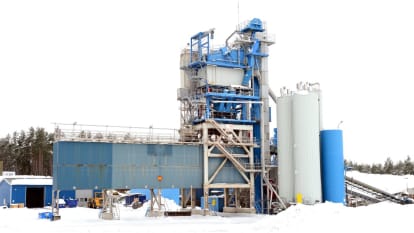NCC continues to reduce its climate footprint
Over just seven years, 25 of some 30 asphalt plants in Sweden have been converted to run on biofuel. There are strong hopes for similar progress in other Nordic countries.
Asphalt consists of crushed rock mixed with a binding agent known as bitumen. This mixture is heated up, which has traditionally been carried out using heating oil as fuel, but due to favorable tax legislation in Sweden, subsidies are available to use biofuel instead. In NCC’s case, wood pellets have been use as fuel. This is a proprietary method, for which NCC holds patents.
“We have made substantial advances over a relatively short period. In 2012, we converted the first plant in Eskilstuna and already close to 80 percent of our Swedish asphalt plants run on biofuel,” says Jacob Jansson, Technical Manager for the Asphalt Division.
In addition to the ongoing conversions in Sweden, where more plants will be converted in the near future, NCC has also purchased a pellets-fired plant in Norway. This is despite Norway not offering any tax benefits to incentivize the use of wood pellets instead of fossil fuel.
“Converting a plant entails a cost, which the Swedish government has chosen to compensate through investment aid. Even though tax legislation in the other Nordic countries is not as favorable as in Sweden, in Norway, we have still chosen to invest in wood pellets initially because we can see that pellets represent the future. Therefore, we nurse considerable hope that the preconditions in the rest of the Nordic region will change and make conversion more beneficial. We view this as a long-term investment,” says Jacob Jansson.
There is also a clear and increasing demand from customers for asphalt produced with lower CO2 emissions.
“We have already noted an increase in the number of agreements specifying such asphalt. The development has not progressed as quickly as one would have thought, but we are sure that within the near future, it will become the norm for asphalt to be produced with biofuel. When all of the plants have been converted, we will have reduced our CO2 emissions essentially to zero.”
NCC’s investment in working with biofuel for asphalt production is seen positively by Christina Lindbäck, the Group’s SVP Corporate Sustainability.
“We have followed the schoolbook in our work with environmental objectives and started with the emissions that we can control ourselves, and where asphalt production and our own work vehicles comprised the major sources,” she says and continues:
“With the lessons we have learned from these efforts, we are now implementing the next stage and systematically mapping the materials we use in production. The construction industry, as a major consumer of materials, has a lot to do in this regard.”
“In 2016, we started to more effectively measure of our emissions from asphalt production and this has really had an impact now that almost 80 percent of our Swedish plants have almost entirely eliminated their CO2 emissions. We will be able to apply the lessons we have learned and are continuing to learn in other parts of NCC’s operations. Accordingly, using our knowledge in terms of how we work with asphalt today and in the future to take the next step has numerous advantages,” says Christina Lindbäck.
